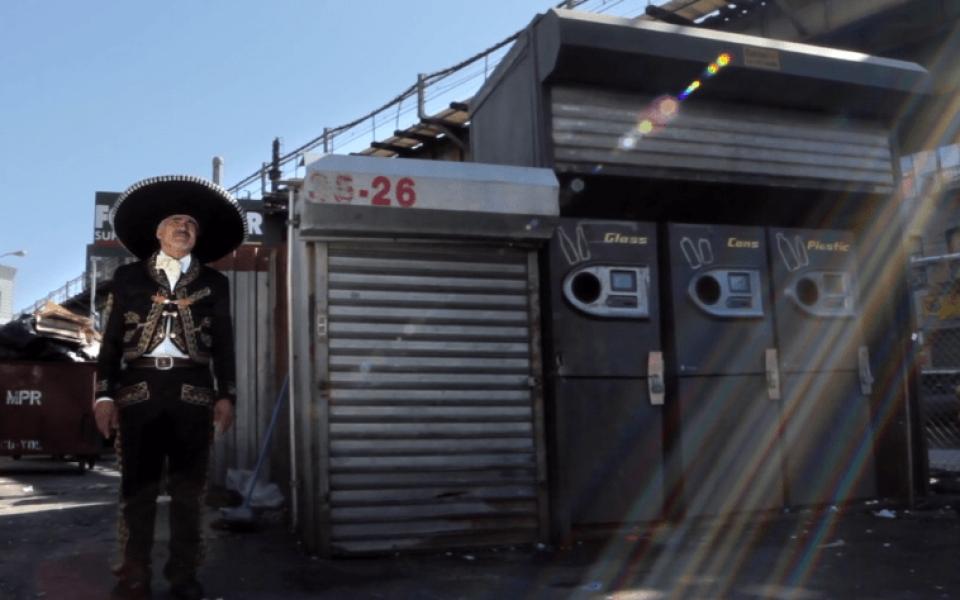“We
left each other long ago,” Filipe, a Brooklyn-based Mexican immigrant, sings in
Spanish.
The
rumbling of the grocery cart against pavement interrupts his song. Plastic bags
tustling against the clank of tin on glass add to his collection of sounds, as
he pulls the cart along at dawn. To protect him from the cool air, he wears a
windbreaker, and to prepare him for his second job of the day, a sombrero rests
atop his head.
“But
now it’s my time to go back,” he continues.
The white-haired Filipe stars in a documentary titled I’m Leaving Now, which holds a spot in a series of Mexican works hosted by A/perture cinema in Winston-Salem. The arrangement, called Cine Mexico Now, began on Monday and runs through Oct. 28, with a total of six films of varying genres.
To
create the Winston-Salem edition of the event, A/perture looked towards a
similar annual series by Cinema Lemont in Detroit, with whom the staff
collaborated in order to model their own version. Executive Director and
Curator of A/perture Cinema Lawren Desai believes hosting such an array of
films fits A/perture’s mission.
“In
our world today, I think it’s really important to see how other people around
the world are living,” Desai says, “and hear their stories in their own
language.”
Each
piece plays in Spanish, with English subtitles, but their scope reaches into as
many facets of Mexican cinema as possible: Horror, romantic-comedy and drama,
along with documentary. Desai also mentioned along with adding many genres, the
schedule prioritized having varying filmmakers, including female directors. The
cinema also took care to avoid commercial films, to give a more genuine look
into the Mexican filmmaking scene.
“We
wanted to be broad and show off what Mexican cinema looks like these days,”
Desai says.
Desai selected films that would defy expectations and explore a vast range of emotional tones and genres. I’m Leaving Now, shown Sept. 30 and Oct. 5, explores a perspective Desai mentions as being integral to understanding the full scope of Mexican cinema through a documentary. A collection of short snapshots of an undocumented immigrant named Filipe fill the film, carrying the viewer from one day to the next, and the next and the next. The yearning he has to return to his family back home echoes in his day-to-day routine, as he struggles to earn enough money for them but also make sure he himself avoids isolation.
“A
lot of immigrants come to the US to work and send money to their families who
don’t come with them,” Desai says, “and oftentimes they can be here for years.”

The closing film, Leona, follows a Jewish woman in her mid-twenties working as a muralist in Mexico City. The part-romantic-comedy, part-drama centers a struggle surrounding dating in a multicultural community, and a sort of coming-of-age. The film, which screens on Oct. 28, is among many of the newer works in the series.
The oldest of the films, which dates to 1934, departs from realism altogether. The Phantom of the Monastery, one of the earliest Mexican horror movies, portrays a ghoulish tale in black and white. UCLA recently restored the film, allowing A/perture to screen it with as much grisly detail as possible on both Oct. 7 and Oct. 12.
Along
with the screenings, A/perture Cinema hopes to illustrate the importance of
these films through talks and a small art gallery that will stay up for the
remainder of the series’ run. The collection displays graphic art from Mexican
artists throughout A/perture’s theater, adding another layer to the cinema’s
focus on the country’s cultural expression.
Though
Desai mentions one of the main goals of the six weeks is providing a space
where the Mexican community of Winston-Salem can come together, she also states
that international films remain enjoyable even for those unfamiliar with the
country’s cinematics. Subtitles, she believes, never interfere with finding
connection through a film.
“It’s
new faces and new stories,” she says, “yet I always find there’s something that
translates about them.”
Find the full schedule for Cine Mexico Now and more about A/perture Cinema at aperturecinema.com.
Join the First Amendment Society, a membership that goes directly to funding TCB‘s newsroom.
We believe that reporting can save the world.
The TCB First Amendment Society recognizes the vital role of a free, unfettered press with a bundling of local experiences designed to build community, and unique engagements with our newsroom that will help you understand, and shape, local journalism’s critical role in uplifting the people in our cities.
All revenue goes directly into the newsroom as reporters’ salaries and freelance commissions.


Leave a Reply